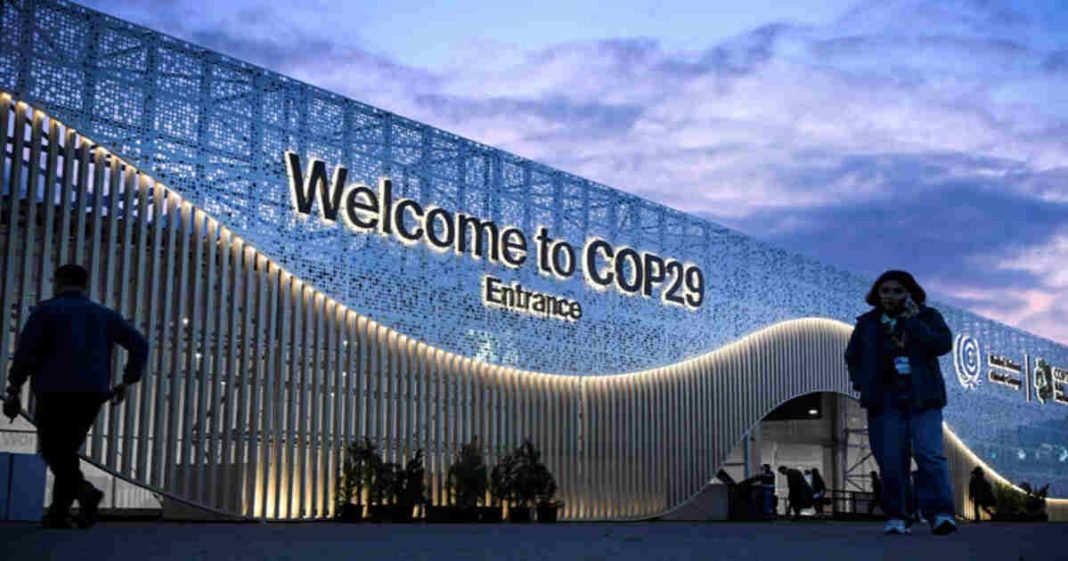As world leaders and negotiators gather in Baku, Azerbaijan, for the COP29 summit, the spotlight has turned to climate finance. Developing nations are calling for at least $1 trillion annually by 2030 to tackle the escalating climate crisis. However, bridging the gap between ambition and agreement remains fraught, with significant divisions between rich and poor countries.
Urgent Need for $1 Trillion by 2030
A new report by the Independent High-Level Expert Group on Climate Finance (IHLEG) warns that delaying action will amplify future costs. The group, chaired by economists Nicholas Stern, Vera Songwe, and Amar Bhattacharya, emphasized the critical need for $1 trillion annually from richer countries by 2030 to help poorer nations transition to green energy and adapt to worsening climate impacts.
Read More: Trump’s Return: What It Means for the Global Climate Change
By 2035, this figure is projected to rise to $1.3 trillion. “The less the world achieves now, the more we will need to invest later,” the report cautions. Lord Stern highlighted that while half of this funding could come from private sector investments, multilateral development banks and grants from developed nations must play a significant role.
“Kicking the can down the road doesn’t help,” Stern urged. The report underscores the economic logic of acting swiftly to prevent the costs of inaction from spiraling.
Grants vs. Loans and Private vs. Public Funding
The COP29 negotiations have revealed stark divides over how climate finance should be structured. Poorer nations argue for grants and public funding, citing failures of private sector financing to address adaptation needs. Richer countries favor mobilizing private investments, supplemented by innovative funding mechanisms like taxes on aviation, shipping, or financial transactions.
The $100 billion annual climate finance goal set under the Paris Agreement was met two years late in 2022, mostly through loans rather than grants, a point of contention for developing countries. Experts warn that repeating this pattern will undermine trust and progress.
Growing Role for Development Banks
Multilateral development banks, including the World Bank, have committed to doubling their climate finance to $120 billion annually by 2030. This includes $65 billion from private sector co-financing. While this is a significant step, many argue it falls short of what’s needed.
“We have been working very hard to push development banks for more funding,” said Yalchin Rafiyev, Azerbaijan’s lead negotiator, who is mediating the contentious talks. However, critics contend that these contributions, though substantial, only scratch the surface of the broader $1 trillion requirement.
Geopolitical Tensions Cloud the Talks
Geopolitics have added complexity to the negotiations. France’s climate minister withdrew from COP29 after Azerbaijani President Ilham Aliyev accused France of colonial-era abuses. Aliyev also criticized Western nations for their continued reliance on fossil fuels despite promoting global climate action. Meanwhile, Argentina pulled its negotiators from the summit under unclear circumstances, adding to the diplomatic strain.
Such incidents underscore the challenges of maintaining focus on climate action amidst bilateral disputes. “The COP Presidency has a particular responsibility to enable and enhance negotiations,” noted European Union climate commissioner Wopke Hoekstra.
Pay Now or Pay More Later
The IHLEG report offers a stark warning: delay will only increase the financial burden. Harjeet Singh, global engagement director for the Fossil Fuel Non-Proliferation Treaty Initiative, stressed that the cost of inaction will outweigh immediate investments. “If COP29 fails to set a meaningful climate finance goal—real trillions in grants, not accounting tricks—we’re all on the losing side,” he said.
Read More: World Bank reports 1.2 billion people at risk due to climate change
Despite the challenges, there are signs of incremental progress. Zakir Nuriyev, head of Azerbaijan’s banking association, announced a $1.2 billion commitment from local banks to support the nation’s green transition. These localized efforts, coupled with the push for broader financial reforms, could provide momentum.














